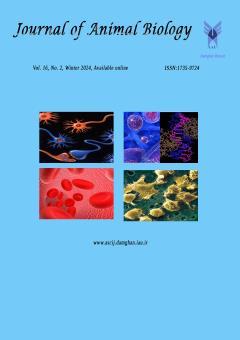Effect of Ginger Powder on Blood Coagulation Factors in Rats
Subject Areas : Journal of Animal BiologyKhatereh Safavi Naeine 1 * , mina fardaei 2
1 - Department of Pharmacology, Arsanjan Branch, Islamic Azad University, Arsanjan, Iran
2 - Department of NursingArsanjan Branch, Islamic Azad University, Arsanjan, Iran.
Keywords: Ginger, Platelet, Fibrinogen, PT, PTT, Rat,
Abstract :
Ginger is used as a food, spice, and herbal supplement for its antioxidant, anti-inflammatory, and medicinal activities. Blood coagulation is the process that causes blood to clot. This process causes the conversion of fibrinogen to fibrin, the activation of coagulation factors, and the accumulation of platelets through two internal and external pathways. The purpose of this research is to investigate the effect of ginger on coagulation factors in male rats. 32 adult male Wistar rats with an approximate weight of 250 grams and 12 weeks old were randomly divided into 4 groups, the control group (without any treatment) and three groups treated with the dry powder of ginger plant at a dose of 20-40 and 60 mg per kilogram of body weight per day. The ginger powder was added to their diet for 7 days. In the end, by taking blood from the heart, the amount of platelets, fibrinogen, PT, and PTT was measured and then the data were analyzed using spss21 software and through one-way ANOVA tests, and Tukey's post hoc test and its graphs were drawn using Graph pad prism 5 software. The results of this research showed a significant increase in the amount of fibrinogen in the group treated with a dose of 20 milligrams per kilogram of weight compared to the control group, a significant decrease in the amount of PT in the group treated with a dose of 60 milligrams per kilogram of weight compared to all three groups, a significant increase in the number of platelets in the group treated with a dose of 40 mg per kilogram of weight compared to the control group. Also, no significant differences were observed in PTT. The research results show that ginger can cause changes in blood coagulation factors in rats.
1. Ajanaku C.O., Ademosun O.T., Atohengbe P.O., Ajayi S.O., Obafemi Y.D., Owolabi O.A., Akinduti P.A., Ajanaku K.O. 2022 Functional bioactive compounds in ginger, turmeric, and garlic. Frontiers in Nutrition, 9:1-25.
2. Bordia A., Verma S.K., Srivastava K.C. 1997. Effect of ginger (Zingiber officinale Rosc) and fenugreek (Trigonella foenumgraecum L) on blood lipids, blood sugar and platelet aggregation in patients with coronary artery disease. Prostaglandins Leukotrienes and Essential and Fatty Acids Journal, 56(5):379-384.
3. Cordier W, Steenkamp V. 2012. Herbal remedies affecting coagulation: A review. Pharmaceutical Biology, 50(4):443-452.
4. Eshaghian R., Mazaheri M., Ghanadian M., Rouholamin S., Feizi A., Babaeian M. 2019. The effect of frankincense (Boswellia serrata, oleoresin) and ginger (Zingiber officinale, rhizoma) on heavy menstrual bleeding. A randomized, placebo-controlled, clinical trial. Complementary Therapies in Medicine Journal, 42:42-47.
5. Elkirdasy A., Shousha S., Alrohaimi A.H., Arshad M.F. 2015. Hematological and immuno biochemical study of green tea and ginger extracts in experimentally induced diabetic rabbits. Acta Poloniae Pharmaceutica, 72(3):497-506.
6. Hatfield J., Saad S., Housewright C. 2022. Dietary supplements and bleeding. Proceedings (Baylor University. Medical Center), 35(6):802-807.
7. Jiang X., Williams K.M., Liauw W.S., Ammit A.J., Roufogalis B.D., Duke C.C., Day R.O., Andrew J., McLachlan A.J. 2005. Effect of ginkgo and ginger on the pharmacokinetics and pharmacodynamics of warfarin in healthy subjects. British Journal of Clinical Pharmacology, 59(4):425-432.
8- Kashefi F., Khajehei M., Alavinia M., Golmakani E., Asili J. 2015. Effect of ginger (Zingiber officinale) on heavy menstrual bleeding: a placebo-controlled, randomized clinical trial. Phytotherapy Research, 29(1):114-9.
9. Khanal A., Devkota H.P, Kaundinnyayana S., Gyawali P., Ananda R., Adhikari R. 2021. Culinary herbs and spices in Nepal: a review of their traditional uses, chemical constituents, and pharmacological activities. Ethnobotany Research Applied, 21:1–18.
10. Koçak L., Yücepur C., Gökler O. 2018. Is ginger effective in reducing post-tonsillectomy morbidity? A Prospective randomized clinical trial. Clinical Experimental Otorhinolaryngology., 11(1): 65–70.
11. Li J., Liang Q., Sun G.C. 2019. Interaction between Traditional Chinese Medicine and Anticoagulant/Antiplatelet. Drugs Current Drug Metabolism, 20(9):701-713.
12. Lumb A.B. 1994. Effect of dried ginger on human platelet function. Thrombosis Haemostasis, 71(1):110–1.
13. McEwen B.J. 2015. The influence of herbal medicine on platelet function and coagulation: a narrative review. Seminars Thrombosis Hemostasis journal, 41(3):300-314.
14. Nouruzi S., Farahani A.V., Rezaeizadeh H., Ghafouri P., Ghorashi S.M., Omidi N., 2022. Platelet aggregation inhibition: An evidence based systematic review on the role of herbs for primary prevention based on randomized controlled trials. Iranian Journal of Medical Sciences, 47(6):505-516.
15. Tan C.S.S., Lee S.W.H. 2020.Warfarin and food, herbal or dietary supplement interactions: A systematic review and meta-analysis. British Journal of Clinical Pharmacology, 87(2):352-374

